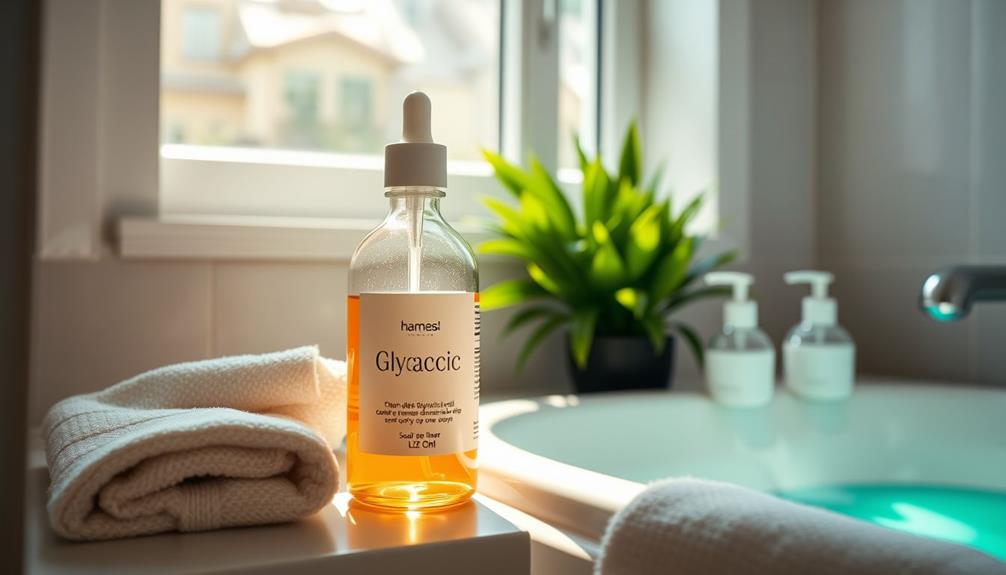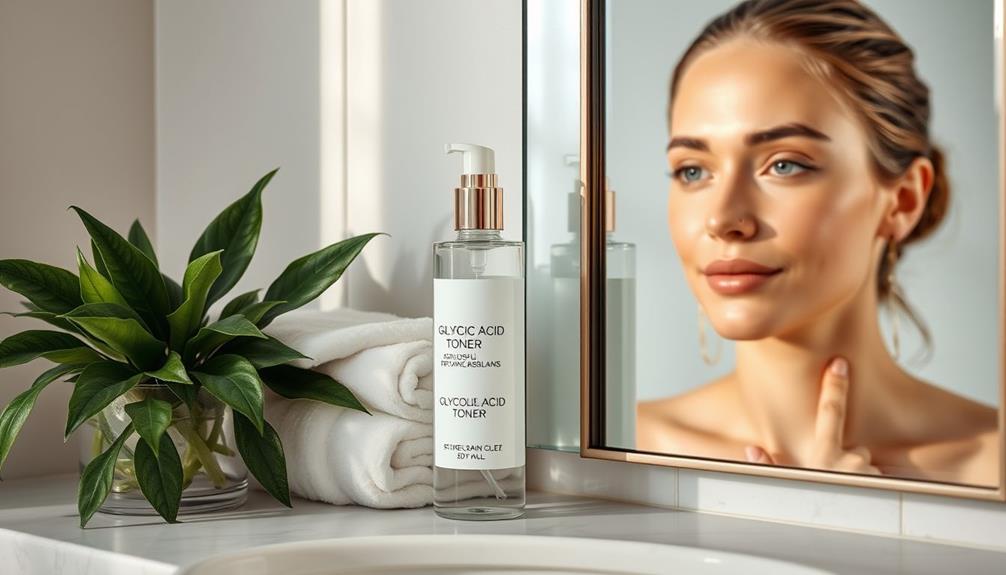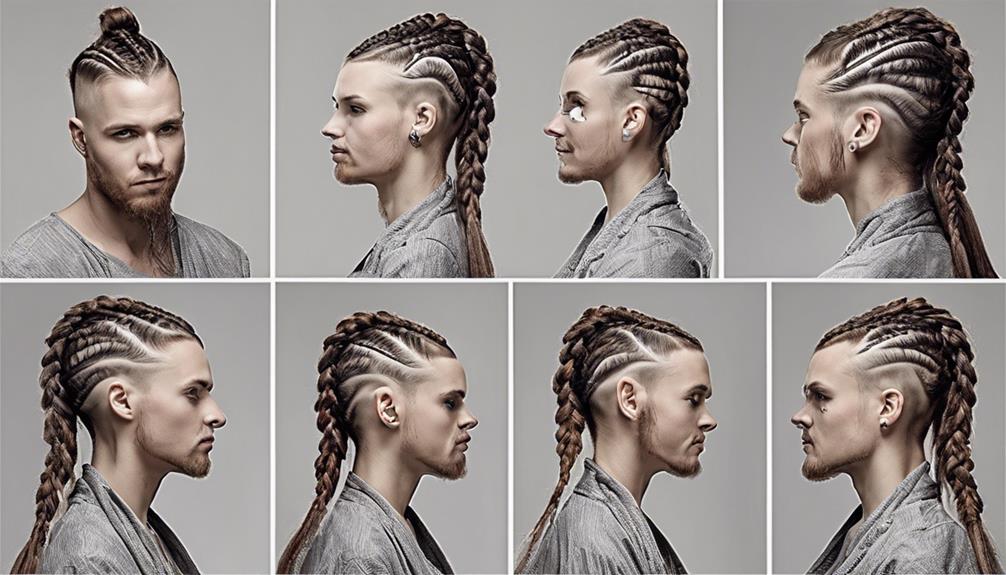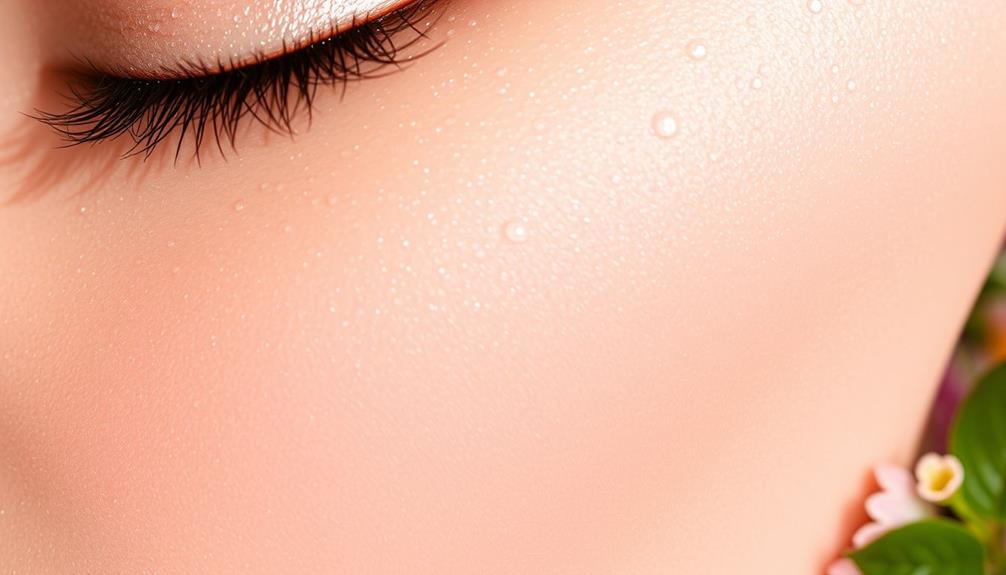Glycolic acid, derived from sugarcane, is a potent exfoliant crucial for scalp care. It works by removing dead skin cells, creating a healthier environment for hair growth and reducing dandruff. You'll find it helps improve moisture retention, decrease inflammation, and promote overall scalp health. When applied as a serum or toner, ideally once or twice a week, it nurtures and revitalizes your scalp. However, it's important to monitor your scalp's sensitivity and avoid high concentrations to prevent irritation. If you're curious about how to incorporate it effectively into your routine, there's plenty more to explore.
Key Takeaways
- Glycolic acid effectively exfoliates dead skin cells, promoting a healthier scalp environment and enhancing hair growth potential.
- Studies indicate that glycolic acid reduces microbial issues, alleviating dandruff and scalp acne through its antibacterial and antifungal properties.
- Regular application of glycolic acid boosts scalp hydration levels, improving moisture retention and reducing hair breakage risks.
- Research suggests that consistent use can enhance nutrient delivery and circulation, supporting overall scalp health and balance.
What Is Glycolic Acid?

Glycolic Acid is a powerful alpha hydroxy acid derived from sugarcane, known for its ability to penetrate deeply into the skin and scalp. This small molecule excels in scalp care due to its effective exfoliating properties. When applied, it works by dissolving the bonds that hold dead skin cells together, making it easier for them to slough off. This process not only promotes a healthier scalp but also improves the overall texture of the skin. The benefits of glycolic acid peel are well-documented, as it can help to unclog pores and reduce the occurrence of acne on the scalp. Additionally, glycolic acid has been shown to stimulate collagen production, leading to improved skin elasticity and a reduction in fine lines and wrinkles. Overall, incorporating glycolic acid into your scalp care routine can lead to a healthier, clearer, and more youthful-looking scalp and skin.
Additionally, incorporating essential oils for hair growth can enhance the benefits of glycolic acid by promoting circulation and nutrient delivery to the scalp.
You'll find glycolic acid in various concentrations, typically ranging from 5% to 10%, ensuring effective yet safe application. Its low pH of around 3.5 enhances efficacy while minimizing irritation.
Beyond exfoliation, glycolic acid also hydrates and revitalizes the scalp, addressing common skin conditions like dryness and flakiness. By incorporating glycolic acid into your scalp care routine, you can help maintain a balanced environment that supports hair growth and reduces issues like dandruff.
Understanding glycolic acid's role can help you make informed choices about your scalp care products, leading to healthier hair and scalp over time.
Mechanism of Action on Scalp
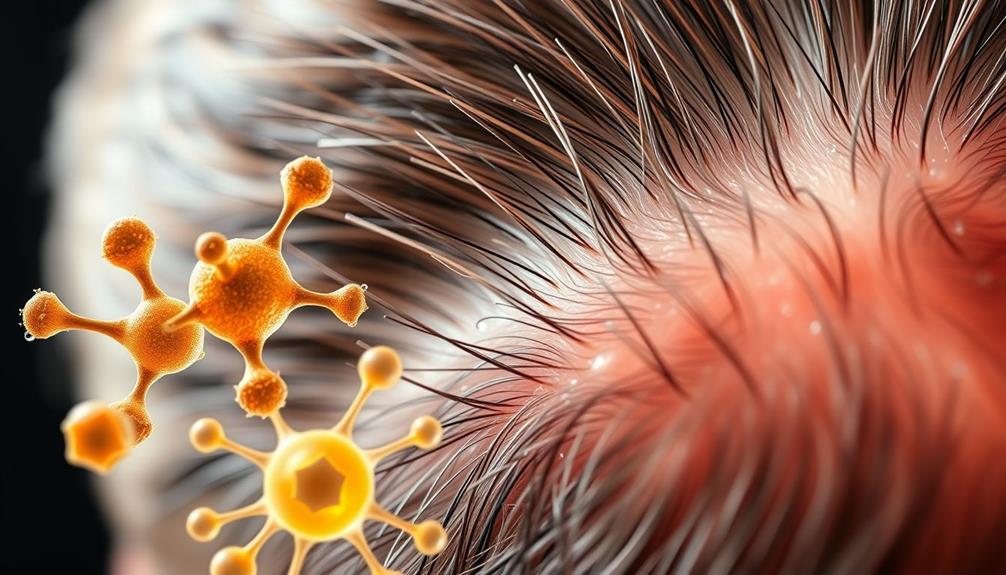
When you use glycolic acid on your scalp, it exfoliates dead skin cells, promoting a healthier environment for your hair.
Additionally, incorporating proper hair treatments can further enhance scalp conditions, as seen in the benefits of hair treatments for damage.
It also targets microbial issues, reducing dandruff and potential fungal problems.
This combined action not only improves scalp health but also enhances the overall vigor of your hair.
Exfoliation Benefits
Regular use of glycolic acid helps loosen and dissolve dead skin cells on your scalp, promoting a healthier environment for hair growth. By exfoliating, you're not just removing debris; you're improving your scalp health in several key ways.
Additionally, incorporating aromatherapy practices, such as the use of essential oils like tea tree or eucalyptus, can complement your scalp care routine by providing antimicrobial benefits and promoting relaxation aromatherapy techniques.
- Enhanced Renewal: Glycolic acid facilitates the removal of excess sebum and debris, leading to cleaner, fresher hair.
- Deep Penetration: Its small molecular structure allows glycolic acid to penetrate deeply, enhancing the texture and elasticity of your hair.
- Balanced pH Levels: By maintaining the scalp's pH, glycolic acid prevents hair shaft swelling caused by alkaline shampoos, which reduces breakage risk.
- Dandruff Prevention: Its antimicrobial properties contribute to treating and preventing dandruff, minimizing flakiness and irritation.
Incorporating glycolic acid into your scalp care routine can greatly enhance your hair's health by ensuring a balanced, clean environment free of dead skin cells. This not only promotes better hair growth but also helps maintain the overall vibrancy of your scalp.
Embrace the exfoliating benefits of glycolic acid for a rejuvenated scalp and luscious hair.
Microbial Action
One key benefit of glycolic acid is its ability to combat harmful bacteria and fungi on the scalp, which can lead to conditions like dandruff and scalp acne. Its microbial action helps prevent the growth of these unwanted microorganisms, creating a healthier environment for your scalp. By addressing the root causes of these scalp conditions, glycolic acid promotes a balanced scalp ecosystem.
Additionally, glycolic acid works by loosening and dissolving dry skin patches, making it easier to remove dandruff and flakes during shampooing. This exfoliating action not only helps clear away buildup but also enhances the penetration of other active ingredients in your hair care products. As a result, you can experience more effective treatment for various scalp conditions.
Moreover, glycolic acid balances scalp pH levels, preventing hair shaft swelling caused by alkaline shampoos. This maintains the integrity of your hair and supports overall scalp health.
Benefits for Scalp Health
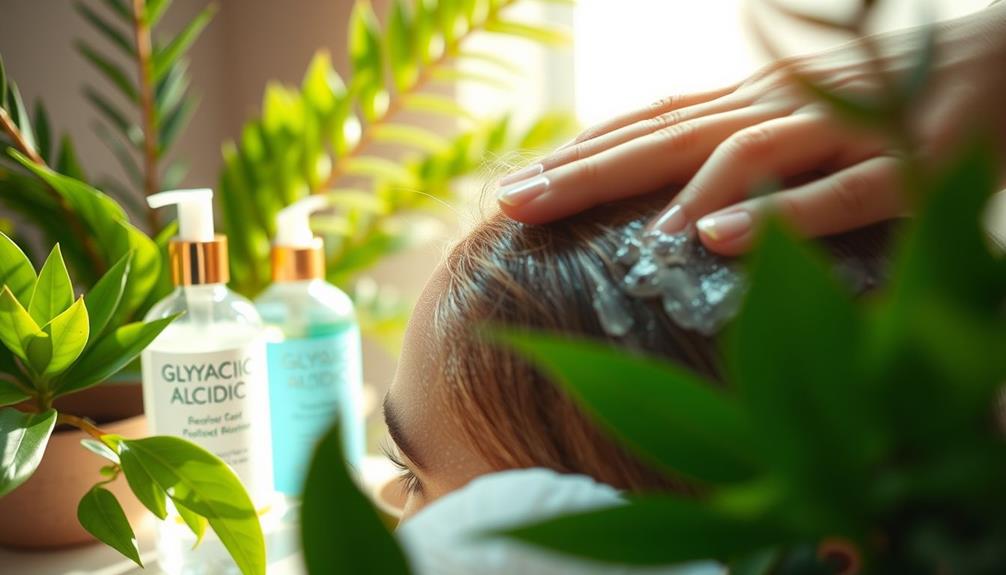
You'll find that Glycolic Acid offers significant benefits for your scalp health through exfoliation and moisture retention.
By effectively removing dead skin cells, it promotes a fresh scalp environment that can reduce issues like dandruff.
Additionally, it helps retain moisture, leading to softer hair and improved elasticity.
Exfoliation and Renewal
Glycolic acid serves as a potent exfoliant, clearing away dead skin cells and fostering a healthier environment for hair growth on your scalp. By regularly incorporating glycolic acid into your scalp treatment, you can enjoy several benefits that promote overall scalp health:
- Effective Exfoliation: Glycolic acid removes buildup, facilitating better absorption of other hair care products.
- pH Balance: It helps balance your scalp's pH levels, reducing the risk of hair shaft swelling and damage from alkaline shampoos.
- Reduced Inflammation: The antibacterial properties of glycolic acid can alleviate scalp acne and inflammation, addressing common issues that may affect your scalp health.
- Enhanced Renewal: Studies indicate that using glycolic acid at a concentration of 5-7% once or twice a week can considerably boost scalp renewal, promoting ideal hair growth.
Moisture Retention Benefits
Many people overlook the importance of moisture retention for scalp health, but it plays a crucial role in maintaining vibrant, resilient hair. Glycolic acid acts as a moisture magnet, enhancing your scalp's ability to retain hydration. Its exfoliating properties help remove dead skin cells, allowing better absorption of moisture and other beneficial ingredients.
Here's a quick overview of the benefits of glycolic acid for moisture retention:
| Benefit | Description |
|---|---|
| Moisture Retention | Increases the scalp's hydration levels. |
| Dead Skin Removal | Promotes better absorption of moisture. |
| pH Balance | Prevents dryness and irritation by balancing scalp pH. |
| Soft Hair | Improves moisture levels, leading to softer hair. |
| Enhanced Hair Elasticity | Promotes healthier hair growth and reduces breakage. |
Application Techniques
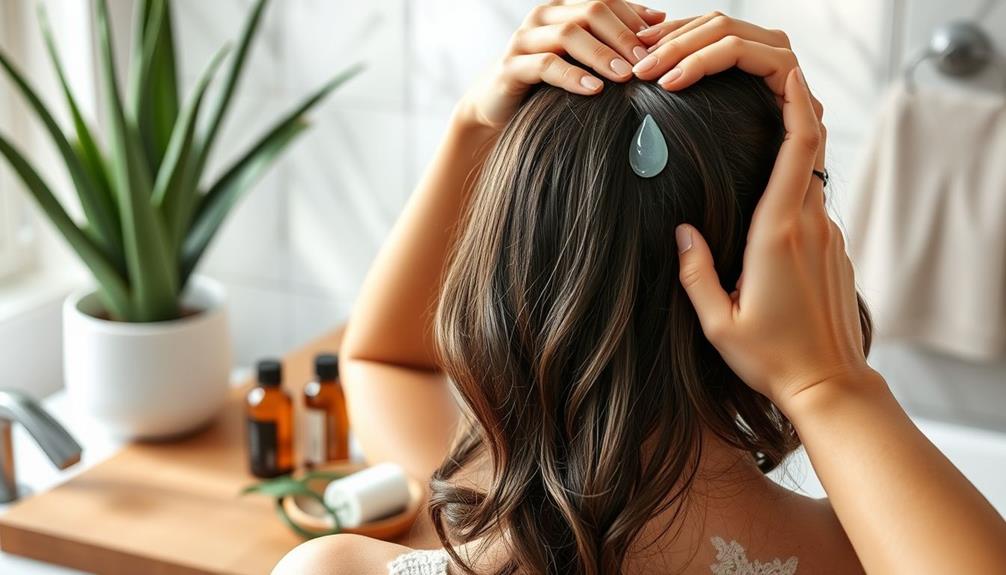
To get the best results from glycolic acid, apply it as a serum or toner with a concentration of 5-7% directly onto your scalp and hair, massaging it in for even coverage. This guarantees effective exfoliation and rejuvenation of your scalp.
Here are some application techniques to reflect on:
- Patch Test: Always start by patch testing on a small area of your scalp to check for any reactions, especially if you have sensitive skin.
- Application Timing: Apply glycolic acid in the evening. This helps reduce the risk of sun sensitivity and irritation.
- Leave it On: Allow the product to sit for 20-30 minutes before rinsing. This gives the glycolic acid enough time to penetrate and exfoliate dead skin cells.
- Follow Instructions: Always adhere to the product-specific directions to avoid irritation. If you experience discomfort, discontinue use and consult a professional.
Recommended Usage Frequency
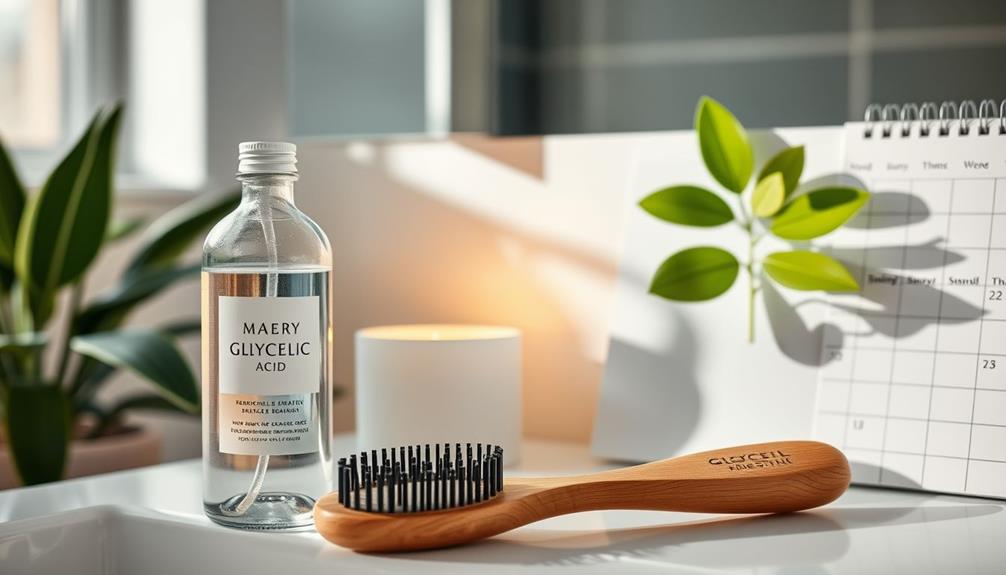
For ideal results, you should apply glycolic acid to your scalp once or twice a week to achieve effective exfoliation without causing irritation. This frequency helps maintain scalp health while allowing your skin to adjust to the treatment.
| Usage Frequency | Recommended Action |
|---|---|
| Once a Week | Initial application for exfoliation |
| Twice a Week | Boost exfoliation, if tolerated |
| Monthly | Maintenance after initial phase |
| As Needed | Monitor scalp response for adjustments |
After your initial use, you can reduce the frequency to once a month or as needed to avoid over-exfoliation. It's best to apply glycolic acid treatments in the evening to minimize UV sensitivity. When using glycolic acid for the first time, start with lower concentrations to gauge how your scalp reacts. Remember, long-term overuse may increase sensitivity or weaken your hair, so keep an eye on your scalp's condition. By following these guidelines on recommended usage frequency, you'll maximize the benefits of using glycolic acid while minimizing potential risks.
Risks and Side Effects
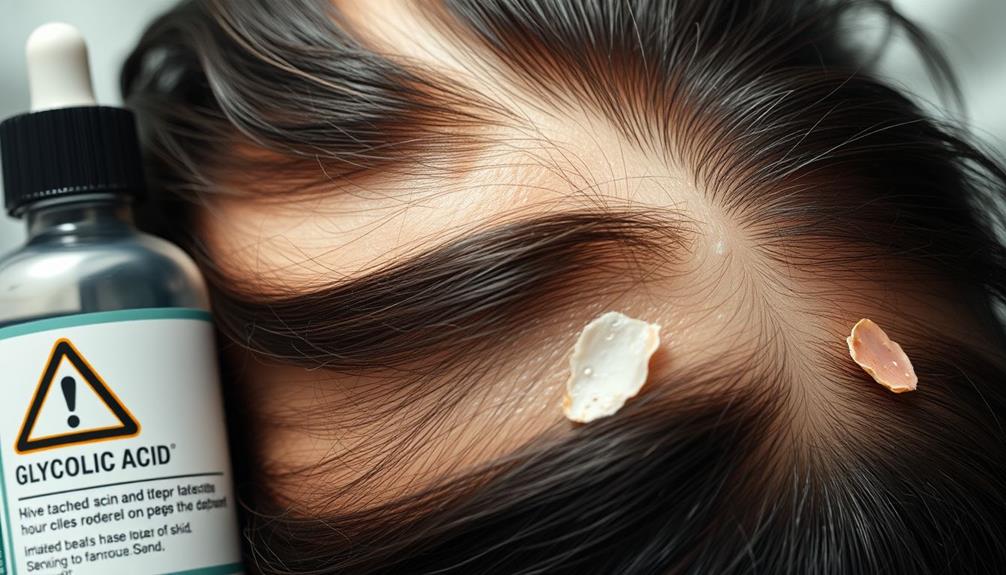
Using glycolic acid can pose certain risks and side effects, especially if applied incorrectly or too frequently. To help you navigate these potential issues, here are some key points to take into account:
- Scalp Irritation: Glycolic acid concentrations above 10% can lead to redness and increased sensitivity. It's essential to use lower concentrations for scalp treatments.
- Hair Loss: Prolonged or excessive use of glycolic acid might weaken hair at the roots, potentially resulting in hair loss if not monitored.
- Increased UV Sensitivity: After applying glycolic acid, you may experience heightened sensitivity to sunlight, increasing your risk of sunburn.
- Side Effects: Common side effects include itchiness and overdrying of both the scalp and hair. Gradual introduction is key to monitoring your scalp's reaction.
If you have open sores, dermatitis, or a very dry scalp, you should avoid glycolic acid altogether. Always consult a healthcare professional before starting any new treatment to verify it's safe for your specific condition. By following the guidelines and being mindful of your reactions, you can minimize the risks associated with glycolic acid.
Alternatives to Glycolic Acid
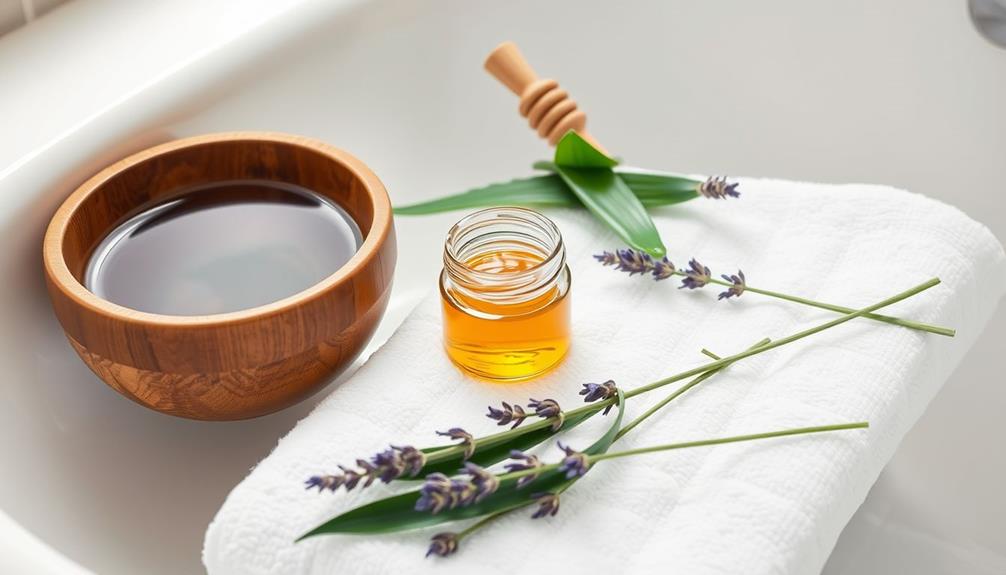
Many effective alternatives to glycolic acid exist for scalp care, offering various benefits depending on your needs.
If you're dealing with hair loss, minoxidil is an FDA-approved topical treatment that promotes hair regrowth and can be an excellent substitute. Finasteride is another option, though it's an oral medication and not recommended for premenopausal women due to potential side effects.
For specific types of hair loss caused by inflammation or autoimmune conditions, steroid creams can be effective.
If you're looking to address scalp issues like dandruff or fungal infections, anti-fungal shampoos containing ingredients such as ketoconazole, zinc pyrithione, or salicylic acid serve as viable alternatives.
You might also explore natural remedies; essential oils like rosemary and peppermint oil are known for their potential to promote hair growth and enhance scalp health, providing a gentle alternative to glycolic acid treatments.
Causes of Hair Loss
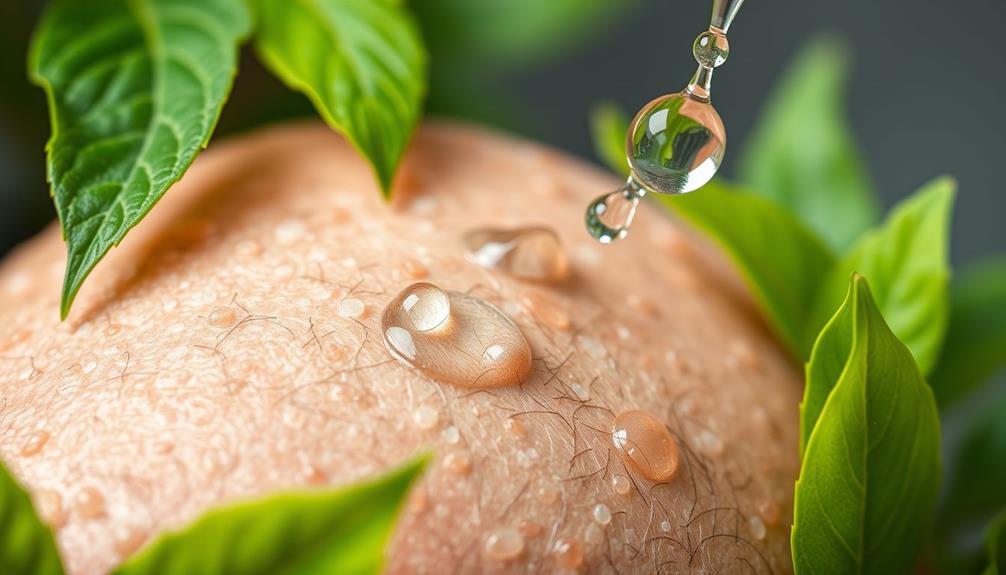
When you experience hair loss, it's often tied to a mix of genetic factors and environmental triggers.
You might find that stress, hormonal changes, or even certain hairstyles contribute to thinning hair.
Understanding these causes can help you take proactive steps in your scalp care routine.
Genetic Factors in Hair Loss
Genetic factors greatly influence hair loss, with androgenetic alopecia being the most prevalent hereditary condition affecting both men and women. This condition typically leads to progressive thinning of hair and is linked to the sensitivity of hair follicles to dihydrotestosterone (DHT), a hormone that can shrink hair follicles over time. If you're concerned about hair loss, understanding your genetic predisposition can be vital.
Here are some key points about genetic factors in hair loss:
- Prevalence: Approximately 80% of men and 50% of women will experience some degree of androgenetic alopecia in their lifetime.
- Family History: Having close relatives with this condition greatly increases your risk of developing hair loss.
- Sensitivity: The condition is closely tied to the sensitivity of hair follicles to DHT, which causes miniaturization.
- Genetic Testing: This can provide insights into your likelihood of experiencing hair loss, enabling early intervention and tailored treatments.
Recognizing these genetic factors can help you take proactive steps to manage hair loss effectively.
Environmental Triggers and Stress
Environmental factors and stress can greatly impact your scalp health, leading to increased hair loss.
Pollution, UV exposure, and harsh weather can cause inflammation on your scalp, worsening existing hair loss conditions. When you're under stress, your body releases hormones like cortisol, which disrupts the hair growth cycle and may lead to telogen effluvium, a condition characterized by temporary hair shedding.
Prolonged exposure to environmental toxins can weaken your hair follicles, making your hair more prone to breakage and loss. Seasonal changes, especially moving from winter to spring, can also affect humidity and temperature, impacting your scalp health and overall hair importance.
Moreover, psychological stressors such as anxiety and depression have been linked to increased hair loss. This connection underscores the significance of mental well-being in maintaining healthy hair.
By addressing these environmental factors and managing your stress levels, you can take significant steps toward healthier scalp health and potentially reduce hair loss.
Consider incorporating scalp care routines that include glycolic acid, as it can help alleviate some of these issues by exfoliating and promoting a healthier environment for hair growth.
Importance of Consultation
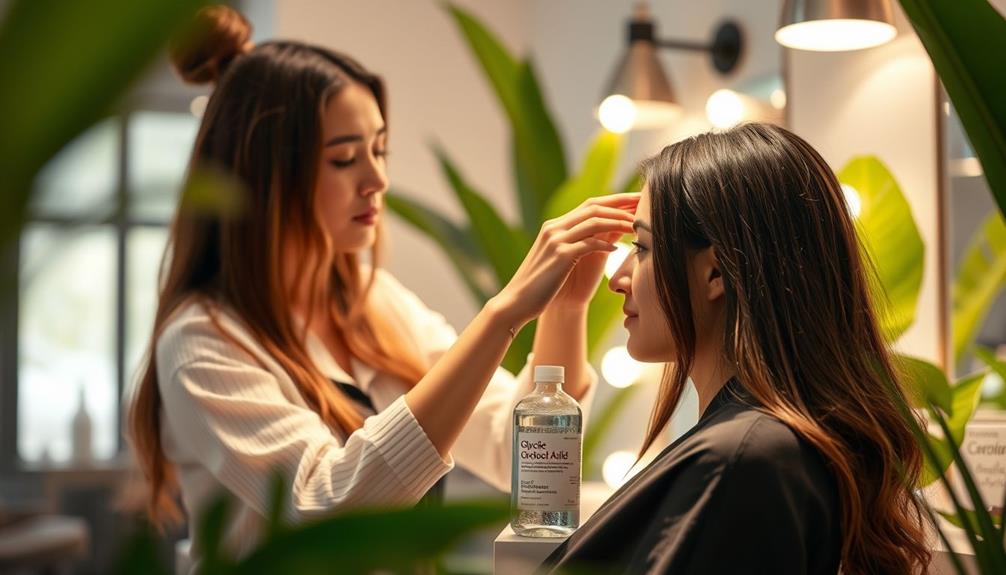
Consulting a dermatologist is vital for identifying scalp issues early and guaranteeing you receive a personalized treatment plan. Many scalp conditions are reversible if caught in their initial stages, making timely professional guidance essential.
Here's why prioritizing consultation can enhance your scalp health:
- Early Diagnosis: A dermatologist can pinpoint specific scalp conditions, allowing for effective treatment.
- Tailored Treatment Plans: They develop personalized assessments that consider your unique scalp and hair type, optimizing your care.
- Safe Glycolic Acid Use: Consulting guarantees you're using glycolic acid safely, particularly if you have sensitive skin or pre-existing conditions.
- Combining Treatments: Dermatologists can suggest complementary treatments that work well with glycolic acid for better outcomes.
Expert Insights on Use
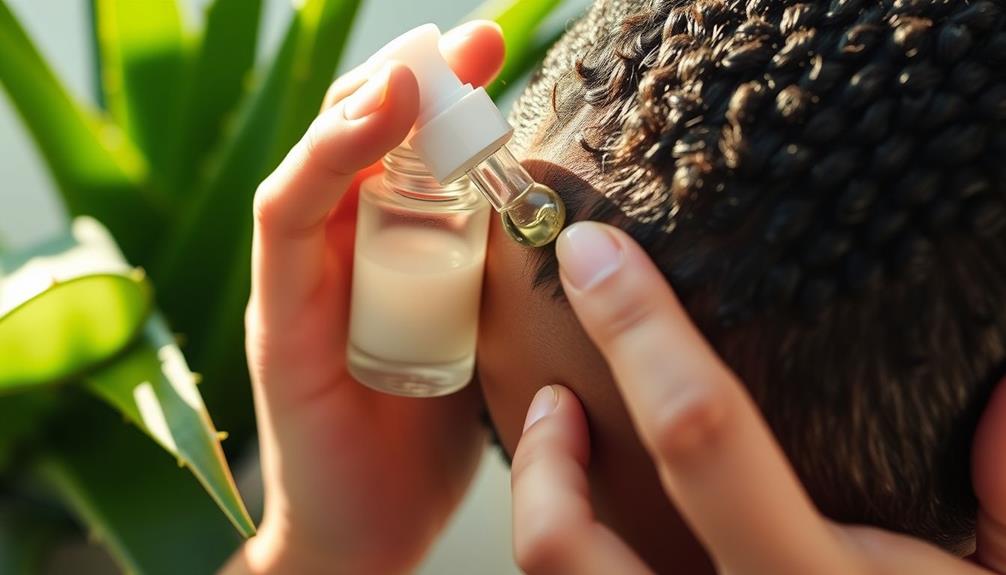
When incorporating glycolic acid into your scalp care routine, experts stress the importance of proper application techniques to enhance its benefits while minimizing potential damage.
Dermatologists like Dr. Marisa Garshick emphasize that using glycolic acid correctly is vital for preventing scalp injuries and maximizing its positive effects on the health of the scalp.
Dr. Azadeh Shirazi points out that glycolic acid has a long history in dermatology, particularly for its exfoliating properties that can greatly boost scalp health.
To guarantee safe use, both experts recommend introducing glycolic acid gradually into your regimen. Start with applications once or twice a week and watch for any adverse reactions.
Monitoring your scalp's response is critical; over-exfoliation can lead to irritation. Consulting with a professional will help tailor your use of glycolic acid to your unique scalp and hair health needs, making sure you're on the right track.
Frequently Asked Questions
What Does Glycolic Acid Do for the Scalp?
Glycolic acid exfoliates your scalp, removing dead skin and debris. It balances pH levels, reduces dandruff and scalp acne, enhances moisture retention, and promotes healthier hair growth by encouraging overall scalp renewal and health.
What Are the Benefits of Glycolic Acid Research?
Imagine using a scalp treatment containing glycolic acid; research shows it exfoliates, boosts moisture retention, and reduces dandruff. You'll enjoy healthier hair and enhanced effectiveness of your other hair care products.
What Is the Effect of Using Glycolic Acid in Hair Care Products?
Using glycolic acid in hair care products exfoliates your scalp, promotes healthier hair growth, and enhances moisture retention. It also balances pH levels, reduces breakage, and improves hair elasticity, making styling easier and more effective.
What Is the Importance of Glycolic Acid?
Did you know that incorporating glycolic acid can increase scalp exfoliation by up to 50%? It's important because it helps maintain a balanced scalp, promotes healthier hair growth, and reduces issues like dandruff and excess oil.
Conclusion
So, if you're ready to embrace glycolic acid as your scalp's new BFF, just remember: it's not a miracle worker, just a really good friend who exfoliates.
Sure, it might help with scalp health and even give your hair a fighting chance, but don't expect it to solve all your hair loss woes.
If only it could sweep in like a superhero, right?
Consult an expert, keep your expectations realistic, and let your scalp shine—metaphorically, of course!
